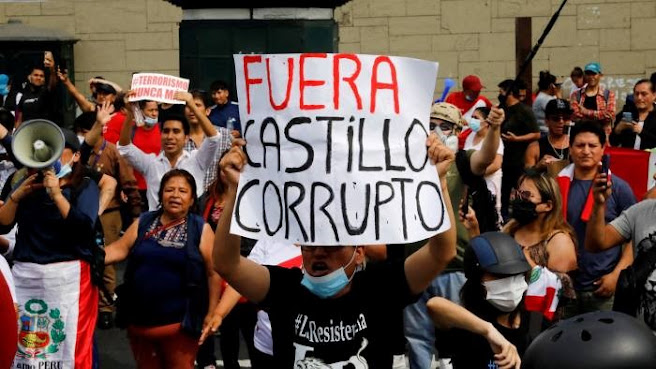Peru’s democracy cannot survive constant turmoil
The Andean nation needs political reform to tackle its deep social problems
The editorial board
 Peruvians protest against Pedro Castillo in Lima after congress approved his removal from presidential office last week © Alessandro Cinque/Reuters
Peruvians protest against Pedro Castillo in Lima after congress approved his removal from presidential office last week © Alessandro Cinque/ReutersPeru’s president was ousted and imprisoned last week, hours after trying and failing to close congress and seize extraordinary powers.
Investors barely noticed.
The Andean nation’s foreign debt and the sol shrugged off the latest instalment of political turmoil: after all, Peru has had six presidents since early 2018, only two of them elected.
A political novice who swapped subsistence farming for the presidency, Pedro Castillo proved spectacularly inept.
The radical left winger’s promises to help Peru’s long-suffering poor proved empty, giving way to a chaotic administration which churned through more than 80 ministers in less than a year and a half.
Corruption, a perennial evil in Peruvian politics, quickly reared its head.
Castillo’s chief of staff fled after $20,000 in cash was found in his office lavatory and prosecutors then homed in on the president and his extended family.
Castillo was accused of heading a criminal conspiracy to skim bribes off public sector contracts.
As legislators gathered to consider his impeachment, Castillo tried to pre-empt them by closing congress and introducing emergency rule.
His gambit failed almost immediately as the army, the police and his own cabinet deserted him and he was arrested after fleeing the presidential palace.
Most regional leaders condemned Castillo’s hapless attempt to subvert democracy but Mexico’s quixotic president, Andrés Manuel López Obrador instead saw fit to attack what he termed a “soft coup” against Castillo carried out by the media and elites.
He offered the would-be Peruvian dictator political asylum — a curious perversion of Mexico’s tradition as a sanctuary for victims of genuine political persecution.
Castillo’s vice-president Dina Boluarte must now pick up the pieces after being sworn in as Peru’s first female leader.
Politically inexperienced, she faces the task of cobbling together a majority from 13 different political blocs in a venal legislature mainly preoccupied with its own survival.
This is unfortunate because Peru’s social and economic problems require urgent attention.
Solid growth and sound macroeconomic management have masked serious deficiencies in public healthcare and education and a gaping divide between the relative prosperity of Lima and the poverty of the provinces.
Progress is unlikely without far-reaching political reform.
Peru is saddled with an authoritarian constitution drawn up by Alberto Fujimori, a president who closed congress and ruled by decree in the 1990s.
Its unicameral parliament of 130 members can be dissolved by the president if it twice rejects his choice as prime minister.
Political parties have proliferated under a poorly designed system of proportional representation, creating a highly fragmented congress where the president must constantly horse-trade.
An archaic law, never properly defined, allows legislators to depose a president for “moral incapacity” — a useful big stick for extracting concessions.
Most parties are little more than vehicles for the personal ambition of their leaders or the promotion of special interest groups.
It is hardly surprising that polls show most Peruvians despise the entire political class.
All this makes it all the more remarkable that Peru has survived multiple political crises over the past decade with its democracy intact.
Its luck is unlikely to hold, investor insouciance notwithstanding.
Congress and the new president urgently need to come together and agree a package of political reforms to put the country on a sound institutional footing and allow its deep-rooted social problems to be tackled.
Otherwise a future coup attempt might succeed.
0 comments:
Publicar un comentario